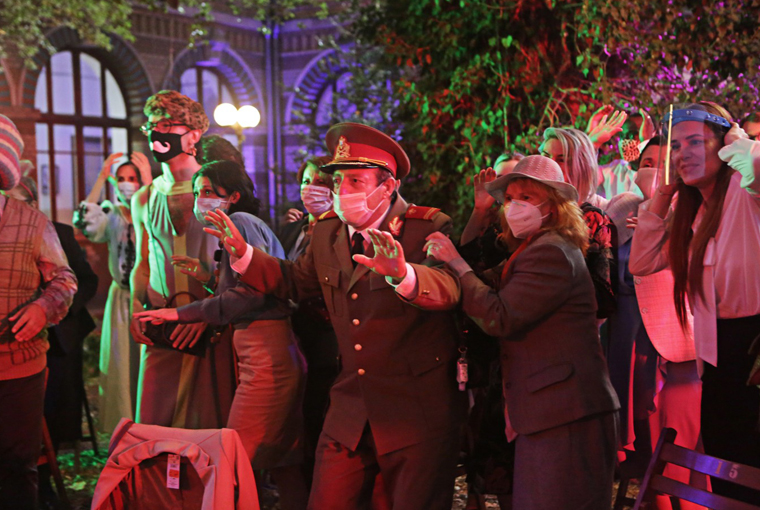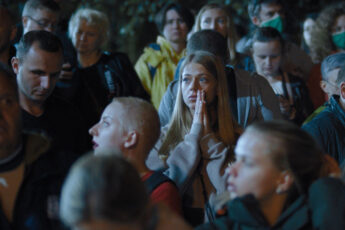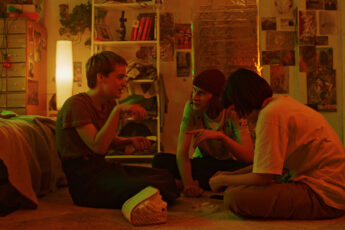This Sex is on Fire
Radu Jude’s Bad Luck Banging or Loony Porn (Babardeală cu bucluc sau porno balamuc, 2021)
Vol. 112 (February 2021) by Zoe Aiano
Living up to its provocative title, Radu Jude’s Bad Luck Banging or Loony Porn opens with an explicit sequence of a couple having sex. Filmed from the first-person perspective of the male party from his phone in conventional home-porn style, we see it all, whether we want to or not. It isn’t immediately obvious whether the scene was purpose-shot or simply fished out of the dark ether that is the internet, a flirtation between documentary and fiction modes that will continue throughout the film’s duration. There are two main giveaway clues that point to it being staged, however. First, in a ridiculous interlude, the female party’s mother persistently calls through the door to remind her to stop at the pharmacy – an exchange that presumably, if real, would have been edited out before being uploaded to PornHub. Second, in the background we catch glimpses of a poster for Adina Pintilie’s controversial exploration of sexuality Touch Me Not, an in-joke turned prophecy, as both Romanian films went on to win top prize at the Berlinale. What follows from this pornographic overture is a dissection of the fall-out from the video, broken down into three distinct parts, each adopting a different language to provide its own particular and disappointed commentary on society today.
Changing gears from the in-your-face opening, the first part is the most conventional, shot in a fairly naturalistic style but with a constant undertone of wry humor. It follows a day in the life of Emi (Katia Pascariu) who, despite being hard to recognize fully clothed and without her distinctive pink wig, is the woman in the video. A teacher at a prestigious school, her position is in jeopardy now that the video has gone viral. She bustles through Covid-era Bucharest with a sense of urgency, if not a clear purpose, as a series of phone calls suggest that the situation is escalating out of her control. As she passes from place to place, she gets embroiled in numerous exchanges largely consisting of unwanted advances and petty spats, many of which turn aggressive and often further degenerate into highly sexualized insults.
As Emi moves through the city space, the camera initially picks her out from the crowd only to then drift off to focus on some seemingly unrelated detail – a shop sign, the vulgar wording of a billboard, a disembodied mannequin leg… On the one hand, it is as if the camera were suffering from attention deficit disorder and is constantly distracted by the ever-present glittering tokens of consumerism. At the same time, this viewpoint also serves as a micro-level proxy for Jude’s own outlook on the city, if not the world, seeking out the absurd in the everyday that has been rendered invisible through normalization. The urban landscape varies between the sterility of the newly constructed areas with their banal excess and the decay of the old architecture, disregarded and festering.
This first segment comes to a close with a shot that lingers wistfully on a long-abandoned cinema, as if unleashing a portal to a new filmic plane. Sure enough, part two opens the floodgates to a frantic montage in the form of a contemporary Devil’s Dictionary (a reference confirmed by the mention of Ambrose Bierce in the credits). All the way from A to Z, Jude presents a typically sardonic super-cut of everything – or at least roughly 26 things – wrong with the world. Chopping abruptly between genres and moods at a nausea-inducing pace, the onslaught of information jumps from archive footage to purpose-shot vignettes, with texts alternating between witty observations and damning facts.
Playing on recontextualization and forcing viewers to take a second look at familiar images – or admit the existence of less familiar ones – this section denounces atrocities committed by the Orthodox church, pokes fun at the commoditization of historical movements (such as the French and Romanian Revolutions, which have now become brands of cigarettes and wine respectively) and wittily undermines parenthood (“children are the political prisoners of their parents”). True to the motif of the title, sex is also a recurring theme. On the more light-hearted side, there are references to pornography from the early days of cinema and trivia about the amount of times the word for “blowjob” is looked up in the Romanian dictionary. On the more serious side, the entry for rape not only includes statistics highlighting its horrific omnipresence in contemporary culture, but significantly also the extent to which female sexuality is still viewed as subservient to the needs of men, who as such have the right to take “what is theirs” by force.
Piece by piece, Jude’s visual rant forms the basis of a proto-manifesto both of the issues to be most urgently addressed, and the role of filmmaking within this. The cinema screen is described as a means for visualizing horror through a palatable refracted lens, just as Perseus’ reflective shield protected him against the deadly effect of the Gorgon’s gaze. Getting to the heart of the film, as well as much (but not all) of the director’s recent work, the alphabet comes to an end with Zen, which is poignantly defined as the endeavor to balance the tragic and the comic.
In the third and final part the action shifts back to Emi and her trial by parent body, which takes place within the confines of her school’s courtyard during a debate to determine whether or not she can be permitted to keep teaching. Once again, the cinematic mode shifts, this time turning toward the theatrical, bordering on a kind of absurdist Socratic dialogue, with garish colored lighting added in to add to the effect. Somewhat unexpectedly, while Emi had not been portrayed as either especially principled or depraved in the earlier scenes, and indeed the film did not appear to take any particular stance on the morality of pornography in general, suddenly she becomes the defender of reason against the ignorant masses. Each of the parents represents a different archetype – the demanding matriarch, the mansplaining intellectual, the old letch, the self-satisfied commercial pilot. To further emphasize this, each one of them is also wearing an individual mask that exemplifies or contrasts with their character, such as the conservative priest sporting a highly questionable “I can’t breathe” slogan or the mother appointed as the hot one who finds it too much of a pity to cover her face and so wears a plastic shield instead.
Predictably, the debate largely sidesteps any actual valid consideration of the implications of children witnessing their teacher in such a loaded context – the parents fully denying any responsibility for monitoring their children’s access to adult content for their part – preferring instead to concentrate on banal discussions of which sexual positions are permitted in a conjugal bed, or the irreconcilability of the sexual woman with the intelligent or capable woman. From here it soon becomes clear that in the context of the film it is Romanian society that is being cross-examined. The policing of sexuality is just the tip of the iceberg of its double standards and prejudice. The group gleefully descends into a celebration of its hatred of Jews, Roma and homosexuals, showing itself to be incapable of self-reflection and insistently refusing to engage with evidence that contradicts their pre-established world view. Of all the things to be mad about, why be mad about sex between consenting adults? The film concludes with three possible outcomes, none of them good.
In many respects, Bad Luck Banging is the apotheosis of all the strands found in Jude’s recent films. The final part in particular manages to touch on all of his favorite soapbox topics, most notably historical denialism of the genocides of Jewish and Roma populations carried out by the Romanian government. The playfully acerbic use of archives is a direct continuation of the approach taken in Uppercase Print, while the compulsive literary references found in many of his films also reappear, with place of honor in this instance going to a brilliant revelation about the national hero Eminescu. Most significantly, it returns to the unadulterated and unapologetic rage of I Do Not Care if We Go Down in History as Barbarians, giving glorious full vent to all the frustration of living on the brink of an apocalypse while all anyone can do is judge their neighbor.
Bad Luck Banging is likely to be remembered as a Zeitgeist film because of the foregrounding of all the key Corona-virus iconography, but it would be a shame for it to be viewed through such a reductive lens. In the film as in the world, the pandemic is really only the surface layer of a seething ball of terribleness, and although very much embedded in the specificities of Romanian society, Bad Luck Banging does a remarkable job of encapsulating the present day refusal to see reason.




Leave a Comment